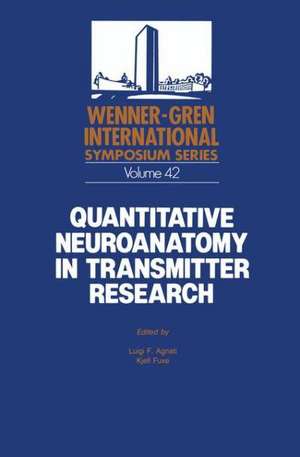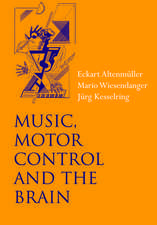Quantitative Neuroanatomy in Transmitter Research: Proceedings of an International Symposium held at The Wenner-Gren Center, Stockholm,May 3–4, 1984: Wenner-Gren Center International Symposium Series, cartea 42
Autor Luigi F. Agnati, Kjell Fuxeen Limba Engleză Paperback – 30 sep 2011
Preț: 396.24 lei
Nou
Puncte Express: 594
Preț estimativ în valută:
75.82€ • 79.17$ • 62.61£
75.82€ • 79.17$ • 62.61£
Carte tipărită la comandă
Livrare economică 15-29 aprilie
Preluare comenzi: 021 569.72.76
Specificații
ISBN-13: 9781461292630
ISBN-10: 1461292638
Pagini: 436
Ilustrații: 432 p.
Dimensiuni: 155 x 235 x 23 mm
Greutate: 0.61 kg
Ediția:1985
Editura: Springer Us
Colecția Springer
Seria Wenner-Gren Center International Symposium Series
Locul publicării:New York, NY, United States
ISBN-10: 1461292638
Pagini: 436
Ilustrații: 432 p.
Dimensiuni: 155 x 235 x 23 mm
Greutate: 0.61 kg
Ediția:1985
Editura: Springer Us
Colecția Springer
Seria Wenner-Gren Center International Symposium Series
Locul publicării:New York, NY, United States
Public țintă
ResearchCuprins
Session I: Morphometrical and Microdensitometrical Studies on Nontransmitter-Identified Neurons.- Quantitative Analysis of Three-dimensional Structures in Neuroanatomy.- Estimating Particle Number and Size.- Tasks in Computer-assisted Neuroanatomy: Data Acquisition, Imaging and Database.- Population Characteristics of Nerve Cell Bodies Illustrated by the Postnatal Development of Cerebellar Granule Cells in the Rat.- Laminar Specificity of Dendritic Morphology: Examples from the Guinea Pig Hippocampal Region.- Studies of Local Blood Flow and Glucose Utilization in Brain by Computer Assisted Autoradiography.- Session II: Morphometry and Microdensitometry of Transmitter-Identified Neurons.- Morphometrical and Microdensitometrical Studies on Monoaminergic and Peptidergic Neurons in the Aging Brain.- Three-dimensional Computer Reconstructions of Catecholaminergic Neuronal Populations in Man.- Topographic Distribution of Catecholaminergic Neurons in the Rat Medulla Oblongata Using Quantitative Three-dimensional Reconstruction.- Effects of Chronic GM1 Ganglioside Treatment on Nigral Dopamine Cell Bodies and Dendrites in Experimental Rats Using Image Analysis—Relationship to the Pharmacokinetic Properties.- Development of Quantitative Methods for the Evaluation of the Entity of Coexistence of Neuroactive Substances in Nerve Terminal Populations in Discrete Areas of the Central Nervous System: Evidence for Hormonal Regulation of Cotransmission.- Principles for the Construction of the Software for Image Analysis of Transmitter-identified Neurons.- Image Understanding and the Cell World Model.- Quantitative Studies of Rodent and Primate Neocortex: Central Monoamine and Peptide Neurons.- Image Analysis of Catecholamine Fluorescence and Immunofluorescence in Studies on BloodVessel Innervation.- Image Analysis of Transmitter Identified Neurons Using the IBAS System.- Image Analysis of Neuronal and Glial Markers: Fluorescence Microscopical Applications.- Session III: Quantitative Immunocytochemistry and Amine Fluorescence Histochemistry.- The Use of Quantitative Immunocytochemistry to Study the Regulation of Tyrosine Hydroxylase in Noradrenergic and Dopaminergic Neural Systems.- Quantitative Cytochemical Studies on Catecholaminergic and Peptidergic Nerve Terminals.- Quantitation of Nerve Terminal Networks of Transmitter-identified Neurons after Selective Neurotoxic Lesions.- Cytofluorimetric Scanning: A Quantitative Method to Study Axonal Transport.- Quantitative Microfluorimetry and Semiquantitative Immunocytochemistry as Tools in the Analysis of Transmitter Identified Neurons.- Session IV: Quantitative Receptor and 2-Deoxyglucose.- Quantitative Autoradiographic Localization of Dopamine Receptors and Uptake Sites in the Rat and Human CNS.- The Use of Quantitative Autoradiographic Techniques on the Study of Drug Action in the Brain: Receptor Autoradiography and 2-Deoxyglucose Technique.- Quantitative Autoradiography as a Tool to Study Receptors in Neural Tissue. Studies on 3H-Oubain Binding Sites and Correlation with Synaptic Protein Phosphorylation in Different Brain Areas.- Quantitative Autoradiography of Drug Binding Sites: Methodological Considerations.- Recent Advances in the Visualization and Quantification of Benzodiazepine Receptors.


















